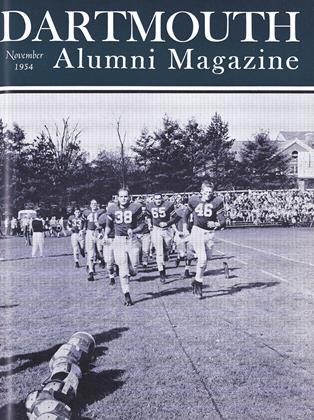BEFORE you read John Gunther's InsideAfrica you might warm up with Robert St. John's Through Malan's Africa (Doubleday, 1954). We are going to hear a good deal about Africa in the next few years, and I suspect that what we hear will not be too reassuring. St. John is a trained reporter, and gives a reasonably comprehensive picture of South Africa and its people. The book also contains a sharp profile of Alan Paton, author of Cry theBeloved Country.
No one with sense would deny the difficulties and problems the whites have in South Africa; but everything they do to keep the blacks in their place (and, after all, Africa is their country) gives the Communists so much more ammunition. The exploiting past of the white races in their superior arrogance is now catching up with them.
Mr. St. John traces the course of Malan's National Government to its present dictatorial powers. The incredible segregation and the violence of racial reactions indicate that South Africa is a land of fear. But there is a word of hope, too. Under the liberal leadership of Michael Scott, Manilal Gandhi, Alan Paton, the African leader Luthuli, and the young intellectuals, South Africa may become, before it is too late, a land of hope.
Before leaving Africa I want to say a few words about Richard H. Sanger's TheArabian Peninsula (Cornell University Press, 1954)- I know of no country in history which has changed so fundamentally in so short a time. Those who may have read T. E. Lawrence, or Doughty, or the Blunts, or Freya Stark or Gertrude Bell will not be surprised to hear that oil has completely revolutionized Arabian life. Where camels once trod, automobiles, jeeps, and pipe-lines run. Only Mecca is still forbidden to the non-Moslem. How long will this city hold out? Dartmouth readers will be especially interested in the account of our own Colonel William Eddy, who has played a large role in modern Arabian history. The story of the signing of the agreement of commerce and friendship with Yemen in 1946 is an extraordinary one. It might have come directly out of a Victor Canning or an Eric Ambler thriller.
Thomas L. Norton '23, Dean of the Bernard M. Baruch School of Business and Public Administration at C.C.N.Y., is mainly responsible for Mr. Baruch's statement of personal philosophy pub- lished in A Philosophy for Our Time.
One paragraph may suffice to indicate its quality: "If we are to preserve our liberties and still meet our economic problems we must learn to apply the political wisdom of our founding fathers to our economic life. Studying the lessons of history, the men who wrote the American Constitution decided that in the long run a government based on the separation of powers would provide the surest safeguard of both property and personal liberty."
Harnett T. Kane, author of a recent fictional novel about Mrs. Robert E. Lee, has now written a composite biography of many courageous and extraordinary men and women (some of whom were hanged) who became the famous spies of the American Civil War. This book. Spiesfor the Blue and Gray, is issued by Hanover House. Rose O'Neal Greenhow, the subject of a recent book, is the subject of the first chapter. Her amazing story is followed by that of Allan Pinkerton, "His Lordship" the Spy, the amazing Lafe Baker, Belle Boyd, and many others. This book may be read along with Burke Davis's biography of Jackson: They CalledHim Stonewall, or, even better, Bruce Catton's now famous trilogy on the Army of the Potomac, about which I have written here before.
John Brick is earning for himself quite a nice reputation as a historical novelist. His last novel, The King's Rangers, was mentioned in this column. His new book, They Ran for Their Lives, contains three escape stories, two of which appeared in Argosy magazine, and the third here printed for the first time. One is the story of an Indian escape in the early days in New York state; another is a Civil War story (escape from Andersonville); and the third tells of an escape from Quebec during Arnold's pre-revolutionary campaign to capture that city. This is, let us say, magazine fiction at its best, but not much more. Interesting and readable none the less.
 View Full Issue
View Full Issue
More From This Issue
-
 Feature
FeatureDOCTORS, ESKIMOS and DOGS
November 1954 By DR. ERWIN C. MILLER '20 -
 Feature
FeatureThe Liberating Arts
November 1954 -
 Feature
FeatureA Backward Glance at the Humanities
November 1954 -
 Class Notes
Class Notes1918
November 1954 By ERNEST H. EARLEY, W. CURTIS GLOVER, RICHARD P. WHITE -
 Article
ArticleThe Undergraduate Chair
November 1954 By G.H. CASSELS-SMITH '55 -
 Article
ArticleA Roster of Dartmouth Alumni Clubs
November 1954
HERBERT F. WEST '22
-
 Books
BooksWHEN WE SKI
April 1937 By Herbert F. West '22 -
 Article
ArticleHanover Browsing
December 1937 By HERBERT F. WEST '22 -
 Article
ArticleHanover Browsing
March 1941 By HERBERT F. WEST '22 -
 Article
ArticleHanover Browsing
April 1944 By HERBERT F. WEST '22 -
 Article
ArticleHanover Browsing
January 1950 By HERBERT F. WEST '22 -
 Article
ArticleHanover Browsing
January 1956 By HERBERT F. WEST '22







